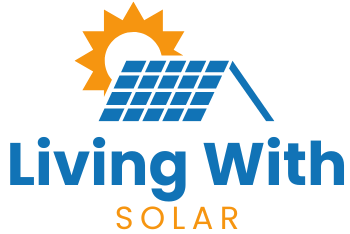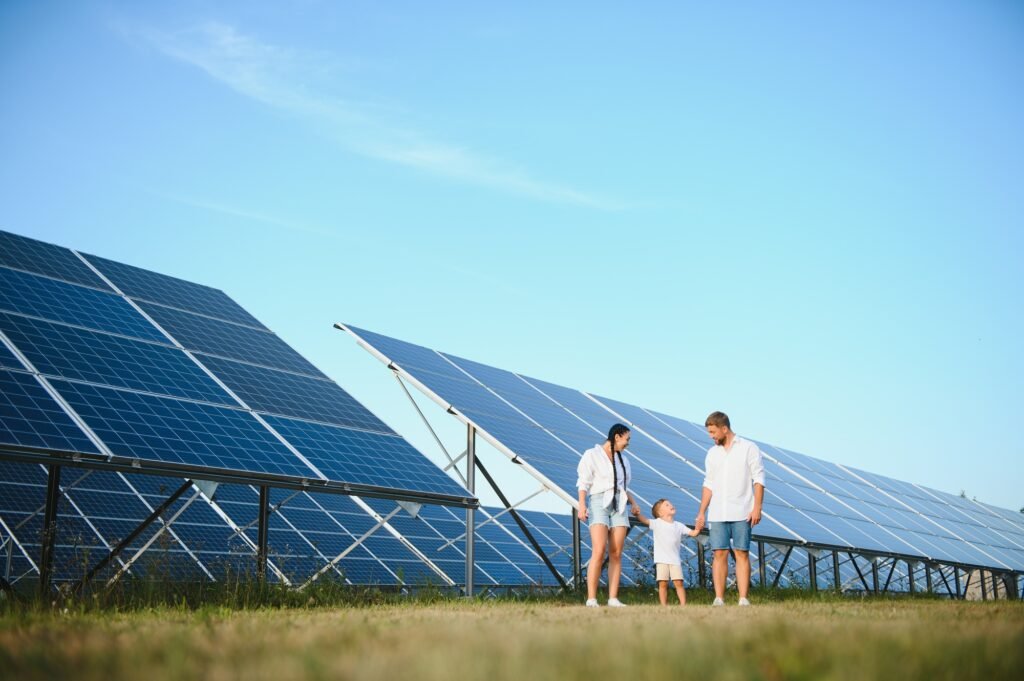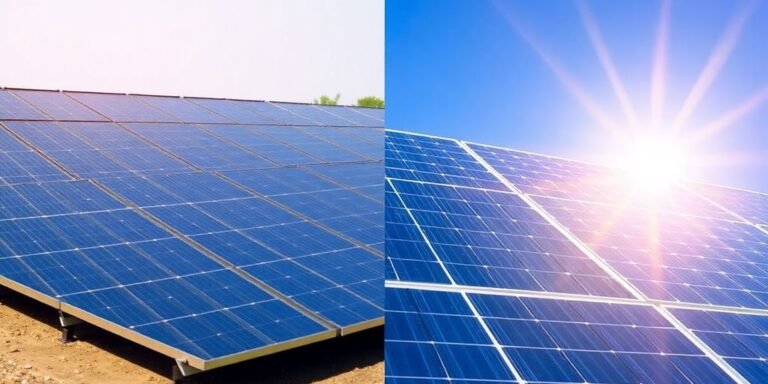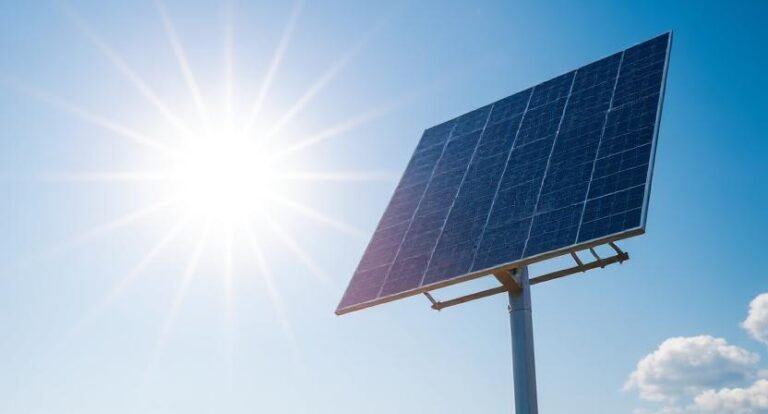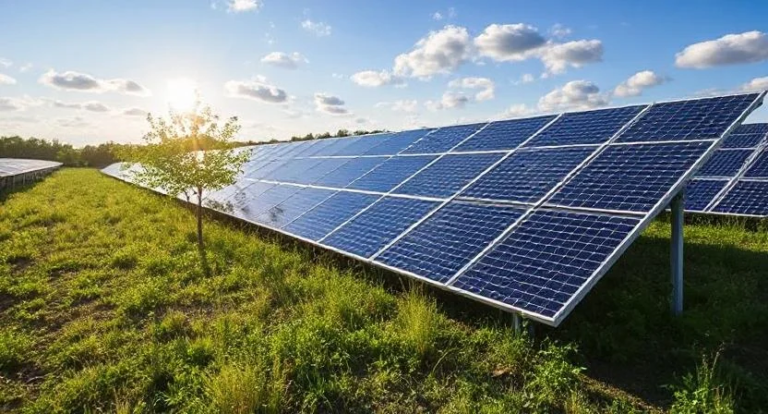Thinking about solar power for your commercial building? The benefits extend beyond just saving money. Knowing the different types of solar systems and their costs is important. Every part, from installation to upkeep and government perks, is important in making decisions. Solar power’s environmental impact and success stories offer helpful insights for businesses. These examples can guide companies in making smart decisions.
Discover Energy Independence – Find Out More →
Key Takeaways
- Cost savings through reduced electricity bills and long-term financial benefits.
- Minimal maintenance requirements with regular inspections and monitoring for optimal performance.
- Enhanced reputation as a sustainable, eco-friendly business with solar power adoption.
- Potential increase in property value and attracting eco-conscious tenants.
- Significant reduction in carbon footprint and environmental impact with solar energy utilization.
Benefits of Solar Power
Rising energy costs and environmental concerns make solar power great for commercial buildings.
Using solar power can cut your electricity bills. This helps you save money over time. Solar panels need little maintenance. This saves you time and resources for your energy system.
Installing solar power in your commercial building can enhance your company’s image as eco-friendly and green.
This attracts eco-friendly customers and partners. It boosts your brand image and sets you apart from competitors.
Installing solar panels can boost your property’s value. This change can give you a good return on your investment.
Also, using solar energy helps cut greenhouse gas emissions and fight climate change.
Choosing solar power shows you care about a greener future. It also supports the global shift to renewable energy.
Using solar power for your commercial building saves you money and helps the planet.
Types of Solar Systems
When adding solar power to your commercial building, it’s key to understand the types of solar systems.

There are three main types of solar systems for commercial buildings:
- Grid-tied
- Off-grid
- Hybrid systems.
Grid-tied systems are connected to the local utility grid and don’t require batteries for energy storage. They allow you to sell excess electricity back to the grid through net metering.
Off-grid systems work without the utility grid. They use battery storage to supply electricity when there’s no sunlight. These systems are ideal for remote locations or areas with unreliable grid power.
Hybrid systems mix grid-tied and off-grid features. They provide grid connectivity and backup power storage.
Every solar system type has its pros and cons. So, assess your building’s energy needs and location first. This helps you pick the best option for your commercial property.
Cost Considerations
What are the costs of a solar power system for your commercial building? How do these costs compare to the long-term savings and benefits?
When thinking about solar power for your commercial building, consider the upfront cost and the long-term benefits.
The upfront costs of solar panel installation can vary. This depends on factors like system size, material quality, and how complex the installation is.
But, these costs are usually less than the big savings on electricity bills during the system’s life. You need to do a cost-benefit analysis. This will help you find the payback period for your solar investment.
Solar power systems lower electricity costs. They can also boost your property’s value. Plus, they show your commitment to sustainability. This may attract eco-friendly customers and tenants.
Many governments provide incentives, tax credits, and rebates. These help lower the initial costs of solar energy adoption. By carefully evaluating the costs and benefits, you can make an informed decision about whether solar power is a financially viable option for your commercial building.
Installation Process
To install a solar power system for your commercial building, you need to understand the process. This knowledge helps ensure a smooth transition to renewable energy.
Installing solar panels has a few key steps. First, a site assessment finds the best spot for sunlight. Once the site is confirmed, the installation process can begin.
This process includes:
- Getting permits
- Setting up the mounting structure
- Connecting the panels to the electrical system
- Performing final inspections to ensure safety compliance
Installation Process Steps
- Site Assessment: Check the spot for the best sunlight.
- Permit Acquisition: Get the permits needed for the solar panels.
- Panel Installation: Install the panels and link them to the building’s electricity.
Maintenance Requirements
What’re the key maintenance requirements for your commercial building’s solar power system?
Regular maintenance is crucial to ensure optimal performance of your solar panels. Check the panels often for signs of damage like cracks or corrosion. Fix any problems right away to stop further damage.
Cleaning the panels periodically to remove dirt, debris, and bird droppings will help maintain their efficiency. Watching the system’s performance through data analysis can spot problems early.
Also, it’s key to have a professional solar technician do regular maintenance checks, along with visual inspections and cleaning.
These checks may include:
- Testing the electrical components.
- Inspecting the mounting structure.
- Making sure all connections are secure.
A maintenance plan from a trusted solar provider can keep you compliant and boost your solar system’s lifespan.
Government Incentives
To get the most from your solar power system for your commercial building, use the government incentives available.
These incentives can significantly reduce the upfront costs and make the transition to solar energy more financially feasible for your business.
Here are some key incentives you should consider:
- Federal Investment Tax Credit (ITC): Receive a tax credit worth 26% of the total cost of installing a solar energy system.
- Accelerated Depreciation: This lets your solar equipment lose value quickly, giving you tax benefits sooner.
- State and Local Rebates: Many states provide cash rebates or incentives for installing solar panels.
- Solar Renewable Energy Certificates (SRECs): You earn credits for the clean energy your system makes. You can sell these credits for extra income.
- Property Tax Exemptions: Some jurisdictions provide exemptions on property taxes for buildings with solar installations.
Environmental Impact

Consider the environmental benefits of a solar power system for your commercial building. By choosing solar power, you’re significantly reducing your carbon footprint.
Fossil fuels release harmful greenhouse gases. This adds to climate change. Solar power, on the other hand, is a clean and renewable energy source that produces no harmful emissions during operation.
Furthermore, solar energy helps in conserving water resources. Traditional power plants consume large amounts of water for cooling purposes, putting a strain on local water sources.
Solar power systems require minimal to no water for their operation, helping to alleviate water stress in drought-prone areas.
Embracing solar power for your commercial building not only reduces your environmental impact but also sets a positive example for others in your community.
Making this eco-conscious choice can lead to a brighter, cleaner future for generations to come.
Case Studies and Success Stories
Numerous commercial buildings across various industries have successfully implemented solar power systems to enhance their sustainability and operational efficiency.
These case studies and success stories serve as inspirational examples for businesses looking to transition to renewable energy sources.
Here are some key takeaways from successful solar power implementations:
- Cost Savings: Businesses report significant reductions in energy bills after installing solar panels.
- Carbon Footprint Reduction: Solar power helps companies lower their carbon emissions and contribute to a cleaner environment.
- Resilience: Solar power provides a reliable source of energy, ensuring business continuity during power outages.
- Marketing Benefits: Highlighting a commitment to sustainability through solar power can attract environmentally conscious customers.
- Government Incentives: Many businesses have leveraged government incentives and tax breaks to offset the initial costs of installing solar systems.
Conclusion
In summary, adding solar power to your commercial building can save money, help the environment, and boost your reputation. To get the most from solar energy for your business, choose the right system. Use government incentives and keep up with maintenance. Make the smart choice for sustainability and efficiency by investing in solar power for your commercial building today.
Frequently Asked Questions
Can Solar Panels Be Installed on All Types of Commercial Buildings?
Yes, solar panels can typically be installed on all types of commercial buildings. Assess factors like roof space, orientation, and shading. This ensures optimal efficiency. Consider consulting with a professional for guidance.
Are There Specific Regulations for Solar Panel Installation in Urban Areas?
In urban areas, specific regulations may exist for solar panel installation. You should research local zoning laws and building codes. These rules could impact where and how solar panels can be placed on commercial buildings in city settings.
What Are the Best Practices for integrating solar power with existing electrical systems?
When adding solar power to current electrical systems, make sure to use proper wiring and safety measures. Consult with professionals to assess system compatibility and capacity. Optimize placement for maximum sunlight exposure. Regular maintenance is key for efficiency.
How Can Businesses Monitor and Track the performance of Their Solar Power System?
To monitor and track your solar power system’s performance, install a monitoring system. This tool provides real-time data on energy generation, usage, and savings. It helps you optimize efficiency, identify issues, and ensure maximum benefits.
Are There Options for Leasing Solar Panels for commercial buildings?
Yes, there are options for leasing solar panels for commercial buildings. You can save on upfront costs, enjoy maintenance benefits, and potentially lower your electricity bills. Leasing provides a hassle-free way to access solar energy.
